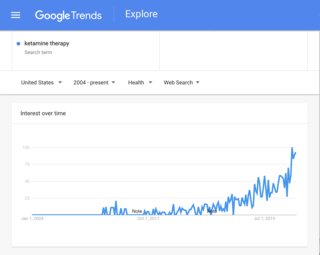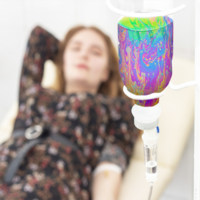Ketamine
Should You Try Ketamine Therapy?
6 questions to ask yourself before trying ketamine therapy.
Posted August 16, 2021 Reviewed by Devon Frye
Key points
- Ketamine is a dissociative anesthetic that is thought to improve the brain's neuroplasticity and was legalized for therapeutic benefits.
- Ketamine has also been found effective in combating treatment-resistant depression, PTSD, and anxiety.
- Ketamine is not 100 percent effective and is usually rather expensive (at least several hundred dollars a "session").
- Ketamine therapy is as much (if not more) about the “therapy” than it is about the “ketamine.”
If you clicked on this headline, there’s a good chance the answer to your question is: possibly! Ketamine is safe and effective. If a passive-aggressive colleague sent you this link, maybe the cure for your problems is to move desks. If you googled this question, make sure the article you're reading isn't posted by a ketamine therapy clinic because, and you'll never believe this: they have an incentive for you to try ketamine therapy.

There has been a marked increase in exposure and interest for this novel therapy, as you can see in the Google Trends chart here. Ketamine has been in a state of heightened media frenzy ever since the FDA approved the ketamine-derived nasal spray Spravato for treatment-resistant depression in March of 2019. Since then, ketamine has been investigated as a helpful treatment for depression, PTSD, anxiety, and slow news days. Recently, there was a major scientific breakthrough in understanding ketamine’s mechanism of action. Last month, Field Trip, a chain of ketamine clinics, was listed on the Nasdaq. Plus, ketamine clinics have been popping up like Starbucks in major urban areas.
Ketamine is a safe and effective form of therapy and, possibly, the first proverbial “drip” in an eventual waterfall of psychedelic-assisted therapy options. Regardless, it's a watershed moment for this novel therapy.
What Is Ketamine Therapy?
Ketamine is a dissociative anesthetic, considered by some to have psychedelic properties. It is thought to affect the glutamate neurotransmitter in the brain, improving neuroplasticity and interrupting ruminative patterns such as those found with depression. Ketamine therapy entails an intake session with a therapist, then several “sessions” in which ketamine is administered, then integration and follow-up meetings with a therapist. Ketamine can be administered through nasal sprays, lozenges, intramuscular injections, or intravenous infusions.
So the question remains: should you try it? To answer that question, here are 6 others:
What’s Bothering You?
If you have treatment-resistant depression, then this treatment might break through that resistance. Ketamine has also been found effective in combating PTSD and anxiety.
If your depression isn’t “treatment-resistant” because you have yet to treat it, you may want to consider conventional antidepressants first. They have been studied more and longer than ketamine has been studied. Plus SSRIs are likely less expensive. However, they take weeks to start working, if at all. They’re only about 20 percent more effective than a placebo and they come with their own lengthy list of side effects.
Ketamine is both short-acting and fairly long-lasting. What does that mean? It means that the effects are felt within minutes and may last for a week to a month. One 2019 study found the heightened effects of ketamine started within minutes and lasted for at least a month after the session. But a different study from that same year found that the effects of a placebo and conventional antidepressants caught up to ketamine’s effects after seven days. So there is a range. But it’s a safe bet that ketamine offers some bang for your buck—if by “bang” you mean fairly stable relief from mental anguish.
If, however, you have ever suffered from psychosis, schizophrenia, mania, or paranoia, please be aware that ketamine may not be for you. There’s a reason ketamine has been considered a “schizophrenomimetic.” That’s not just an award-winning spelling bee word, it’s the name for a drug that can mimic schizophrenia-like mental conditions.
Are You Prone to Addiction?
You might think that an affirmative response to this question would preclude you from being a good candidate. But in fact, ketamine may actually be a good treatment for addiction. Two clinical trials showed that ketamine reduced the chance of relapse for cocaine addicts and alcoholics. Ketamine has shown positive results in treating nearly every kind of addiction—except for addictions to ketamine, of course. (Shockingly, the treatment for ketamine addiction is not more ketamine.)
How Risk Intolerant Are You?
Currently, there are no long-term studies about the effects of ketamine as opposed to many conventional antidepressants. Also, ketamine is not 100 percent effective. But then again, literally no treatment is 100 percent effective at curing depression—except perhaps puppies (but this is personal conjecture as no clinical studies have been done yet).
There are also some concerns over risks to the liver, bladder, and kidney. Ketamine can increase heart rate and blood pressure. So people with issues like hypertension may want to steer clear. It’s really a question for your primary care doctor, not an internet blogger, no matter how informative and entertaining she might be.
Are You Afraid of Needles?
Intravenous Infusions are by far the most commonly used and most commonly studied method for administering ketamine. This is because the dosage can be extremely carefully controlled and the journey can be stopped at any moment. The drip controls the trip.
Intramuscular injections are delivered into the thick muscles of your arm, hip, thigh, or if you want the real veterinary clinic feel, the buttocks. With IM infusions, ketamine is administered all at once and cannot be titrated down once injected. IM infusions cannot be as easily mixed with medicines to combat nausea and increased blood pressure.
There are also lozenges and Spravato, the nasal spray which uses esketamine, to consider. Both are administered under supervision (either in an office or remotely on Zoom). These are cheaper alternatives since they do not require special equipment nor a physician trained in anesthesiology. They’re also convenient since patients may even administer the treatment at home themselves. However, both provide relatively lower dosage than the infusion route due to imprecise administration.
Whichever method you’re considering, by far, the most important part of the process is the role played by a mental health professional. Whether this is a psychiatrist, therapist, or integration coach, make sure this is an individual you feel safe around.
How Much Are You Willing to Spend?
Take a deep breath. Assuming you don’t have a chronic pain syndrome, there is a very high chance that insurance will not cover ketamine therapy. Infusions may set you back several thousand dollars but it will include a half dozen infusions sessions, an intake, integration sessions, and follow-ups. The nasal spray Spravato can cost from $590 to $885 per treatment session. But how many treatment sessions are needed is up for debate. Lozenges (administered in the office or monitored remotely over Zoom) can cost about a thousand dollars for 1-6 sessions depending on where you go.
All of the options have a range but all will cost at least several hundred dollars. Unfortunately, the field is new and speculative and therefore, draws many hucksters. Make sure to take time to research your clinic and read any reviews if available.

What Else Should You Know?
Ketamine therapy is as much (if not more) about the “therapy” than it is about the “ketamine.” Make sure you’re working with a clinician you trust and make sure to see an integration therapist with whom you share a connection. Integration is the process of talking with a therapist after a psychedelic or psychoactive session in order to glean meaningful therapeutic insight. Ketamine is a novel and exciting part of the treatment but it’s the therapy that can really lead to lasting change beyond the neural rewiring.




